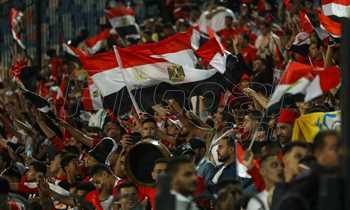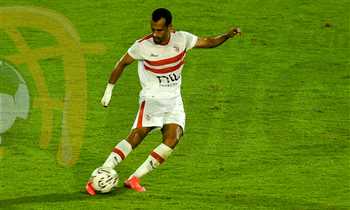
كتب : عمر عبد العزيز | الثلاثاء، 20 نوفمبر 2012 - 00:15
Al-Badri earned it
Apart from the continuous fad of moaning and groaning about ‘lack of competitive football’ and the customary excuse of ‘working under difficult conditions’, the Ahli tactician has gone the extra mile for several other reasons as well.
Sublime football with the 4-3-2-1
This Ahli team have taken no time at all to adapt to Al-Badri’s preferred four-man defense system, switching from the traditional 3-5-2 usually deployed by Manuel Jose.
The tactical change was no surprise though as Al-Badri has always been a big fan of the 4-4-2 system, but Ahli’s improvement in all areas of the field suggested that the man on the bench has nurtured as a tactician during his two years out of the club.
Ahli’s backline was not as leaky as it used to be during Al-Badri’s first stint and although they did not keep that many clean sheets, a plethora of goals at the other end of the pitch made up for the approximately one-goal per game they’ve conceded.
A significant feature that illuminated Ahli’s Champions League was the number of quality goals scored by the team.
In the final double-header with Esperance, the Reds hit three brilliant team goals and the finishing was clinical in every one of them.
Prior to that, Geddo netted a terrific team goal against Sunshine Stars in Cairo, similarly scored a fine brace in Nigeria and above all that, Walid Soliman’s brace against Berekum Chelsea was something from another world.
The bottom line is that the quality of the goals scored by Ahli is a clear signal to the attractive football Al-Badri’s men have been playing in this season’s Champions League.
In addition to the fact that they were the highest-scoring team, another interesting stat emphasizes that Ahli scored 13 open-play goals out of 16 under Al-Badri.
And it wasn’t an easy ride as Ahli had to face a good number of high-profile opponents in the likes of former champions Mazembe, Zamalek and Esperance en route to the podium.
Better man-management
One of the major concerns of the many skeptics initially doubting Al-Badri’s credentials was his ‘lack of experience in dealing with personnel’.
Reports of past rifts with big names like Barakat, Abou-Treika and ex-midfielder Ahmed Hassan quickly surfaced as the man was about to begin his second stint.
But the allegations were swiftly laughed off and Al-Badri proved it when he showed support to Abou-Treika in the infamous Super Cup saga, while remaining silent all the way during the controversial case.
Whether he was right to do it or not, Abou-Treika’s decision to pull out of the Super Cup game created an unnecessary atmosphere of tension with his Ahli teammates.
Dressing-room unrest is the last thing a manager needs during the course of a tough competition like the Champions League.
However, the problem was perfectly contained inside the Reds camp and Abou-Treika’s suspension has hardly had an impact on the team as well.
On the pitch, Al-Badri was also able to get the best out of some players like the out-of-favor Al-Sayed Hamdi, who turned from zero to hero in just a couple of games near the end of the campaign.
The rediscovery of Hamdi as a second-striker behind Geddo could definitely benefit Bob Bradley’s Egypt, given the former’s impressive goalscoring record with the national team.
مقالات أخرى للكاتب
-
لهذه الأسباب...#تحيا_الجزائر الثلاثاء، 01 يوليه 2014 - 16:26
-
تحليل: الخطأ الشنيع الذي أسقط مصر في غانا الأربعاء، 16 أكتوبر 2013 - 18:10
-
Ghana have every right to protest against Egypt fixture الأربعاء، 09 أكتوبر 2013 - 00:45
-
Egypt will never find another Bradley الأربعاء، 11 سبتمبر 2013 - 22:37
نرشح لكم
 تعليق من الزمالك بعد بيان النيابة العامة بشأن أرض 6 أكتوبر
تعليق من الزمالك بعد بيان النيابة العامة بشأن أرض 6 أكتوبر
 خدمة في الجول - احجز تذاكر مباراة مصر ونيجيريا الودية
خدمة في الجول - احجز تذاكر مباراة مصر ونيجيريا الودية
 مران الزمالك - عودة الونش وعواد قبل مواجهة حرس الحدود
مران الزمالك - عودة الونش وعواد قبل مواجهة حرس الحدود
 النيابة العامة تكشف عدد من الحقائق بشأن أرض الزمالك في 6 أكتوبر
النيابة العامة تكشف عدد من الحقائق بشأن أرض الزمالك في 6 أكتوبر

 خبر في الجول – روقا يشكو الزمالك في فيفا بسبب مستحقاته المتأخرة
خبر في الجول – روقا يشكو الزمالك في فيفا بسبب مستحقاته المتأخرة

 مصدر من الأهلي يكشف لـ في الجول تفاصيل اجتماع الخطيب وعبد الحفيظ مع توروب
مصدر من الأهلي يكشف لـ في الجول تفاصيل اجتماع الخطيب وعبد الحفيظ مع توروب
 توروب: الشناوي وشوبير؟ لست هنا لأصنف الحراس.. وهذا موقفي من عبد الكريم وديانج
توروب: الشناوي وشوبير؟ لست هنا لأصنف الحراس.. وهذا موقفي من عبد الكريم وديانج

 برزي: لا نفكر في الاستقالة.. وسنحارب من أجل حقوق الزمالك
برزي: لا نفكر في الاستقالة.. وسنحارب من أجل حقوق الزمالك
















 مباشر الدوري الإسباني - ديبورتيفو ألافيس (0)-(0) ريال مدريد.. محاولة من مبابي
مباشر الدوري الإسباني - ديبورتيفو ألافيس (0)-(0) ريال مدريد.. محاولة من مبابي


































